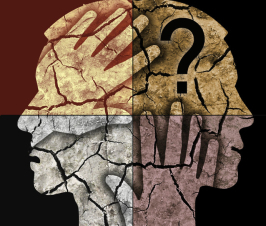In just a few months, the COVID-19 pandemic swiftly and substantially worsened mental health among U.S. hourly service workers and their children — especially those experiencing multiple hardships, according to new research from the Center for Child and Family Policy at Duke University and Barnard College.
COVID-19 pandemic swiftly and substantially worsened mental health among U.S. hourly service workers and their children
The study leverages real-time, daily survey data collected from Feb. 20, before the pandemic hit the U.S., to April 27, when it was well underway, to examine how the crisis affected parents’ and children’s mental well-being. The 645 survey respondents were parents of young children working in hourly service-industry positions in retail, food service or hotel industries in a large U.S. city.
Nearly half (49.5%) of the participants were Black Americans, 23% were Hispanic Americans, and 83% were women.
The findings appear in Pediatrics.
Surveys showed strong, immediate impacts of the pandemic on vulnerable families
The surveys showed strong, immediate impacts of the pandemic on vulnerable families. Parents saw quick deterioration in their own mental well-being, reporting more frequent “negative moods” since March 14, the day after the first major restrictions in response to COVID-19 were announced. The majority of respondents experienced multiple hardships, including household job loss (60%), income decline (69%), caregiving burden (45%) and illness (12%).
“The COVID pandemic has created substantial hardship for working families,” said Anna Gassman-Pines, co-author of the study and associate professor of public policy at Duke’s Sanford School of Public Policy. “What’s worse is that the more hardship families experienced, the worse parents’ and children’s mental health.”
Those who experienced two and three hardships reported more negative moods
Not surprisingly, those who experienced two and three hardships reported more negative moods, worse sleep quality and more uncooperative child behavior than those who did not. For both parents and children, mental health was worst among those who suffered all four hardships.
“These results should raise concern, given the strong links between parental psychological well-being and the well-being of children,” the authors write.
Gassman-Pines and co-author Elizabeth Ananat of Barnard College suggest pediatricians should screen for mental health problems among children in their practices, with particular attention to children whose families are especially vulnerable to both the economic and health aspects of the crisis.
Pediatricians should also help parents understand and watch for potential signs of mental distress
During the stressful pandemic, pediatricians should also help parents understand and watch for potential signs of mental distress, the authors write. Those may include uncooperative behavior and acting out.
The authors also urge the government to provide more support for families, through restarting expanded unemployment insurance benefits and increasing the generosity of the Supplemental Nutrition Assistance Program.
“What we really see here is that, as hardships pile up, the combined weight causes severe distress for families. Resilience only takes you so far, and the multiple dimensions of hardship caused by this pandemic — lost jobs, lost child care and education, sickness — are stretching families to the breaking point,” said Ananat. “Families need support, from their pediatricians and, hopefully, from the government.”
This research was supported by the Eunice Kennedy Shriver National Institute of Child Health and Human Development, National Institutes of Health (Grant #1R21HD100893-01), the National Science Foundation (Award # SES-1921190), the Russell Sage Foundation (Grant #1811-10382) and Washington Center for Equitable Growth.
1. Anna Gassman-Pines, Elizabeth Oltmans Ananat, John Fitz-Henley. COVID-19 and Parent-Child Psychological Well-being. Pediatrics, 2020; e2020007294 DOI: 10.1542/peds.2020-007294

Razi Berry is the founder and publisher of the journal Naturopathic Doctor News & Review, which has been in print since 2005, and the premier consumer-faced website of naturopathic medicine, NaturalPath. She is the host of The Love is Medicine Project docuseries, The Natural Cancer Prevention Summit, The Heart Revolution-Heal, Empower and Follow Your Heart, and the popular 10-week Sugar Free Summer program. From a near death experience as a young girl that healed her failing heart, to later overcoming infertility and chronic fatigue syndrome and fibromyalgia through naturopathic medicine, Razi has lived the mind/body healing paradigm. Her projects uniquely capture the tradition and philosophy of naturopathy: The healing power of nature, the vital life force in every living thing and the undeniable role that science and mind/body medicine have in creating health and overcoming dis-ease. You can follow Razi on social media: Facebook at Razi Berry, Instagram at Razi.Berry and join the Love is Medicine group to explore the convergence of love and health. Look for more, and listen to more Love is Medicine podcast episodes here.

















